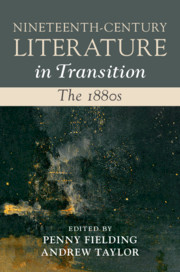Book contents
- Nineteenth-Century Literature in Transition: The 1880s
- Nineteenth-Century Literature in Transition
- Nineteenth-Century Literature in Transition: The 1880s
- Copyright page
- Contents
- Figures
- Contributors
- Acknowledgments
- Introduction: ‘Knowledge Made for Cutting’
- Chapter 1 Mermaids Amongst the Cables: The Abstracted Body and the Telegraphic Touch in the Nineteenth Century
- Chapter 2 Enclosing Forms, Opening Spaces: The 1880s Fixed-Verse Revival
- Chapter 3 ‘The Newest Culte’: Victorian Poetry and the Literary Societies of the 1880s
- Chapter 4 The Time of W.E. Henley: ‘Minor Poetry’ and the 1880s
- Chapter 5 The Evolution of Point of View
- Chapter 6 Network, History, Method: Andrew Lang in and after the 1880s
- Chapter 7 Animated Conversations: Form, Transformation and the Category of the Novel in the 1880s
- Chapter 8 Henry James, Vulgarity and Transatlantic Moderation
- Chapter 9 He and She: The 1880s, Camp Aesthetics and the Literary Magazine
- Chapter 10 Men, Women and Horses: Public Spectacle in 1887
- Chapter 11 The Secular Turn in British Literature of the 1880s
- Index
Chapter 9 - He and She: The 1880s, Camp Aesthetics and the Literary Magazine
Published online by Cambridge University Press: 10 October 2019
- Nineteenth-Century Literature in Transition: The 1880s
- Nineteenth-Century Literature in Transition
- Nineteenth-Century Literature in Transition: The 1880s
- Copyright page
- Contents
- Figures
- Contributors
- Acknowledgments
- Introduction: ‘Knowledge Made for Cutting’
- Chapter 1 Mermaids Amongst the Cables: The Abstracted Body and the Telegraphic Touch in the Nineteenth Century
- Chapter 2 Enclosing Forms, Opening Spaces: The 1880s Fixed-Verse Revival
- Chapter 3 ‘The Newest Culte’: Victorian Poetry and the Literary Societies of the 1880s
- Chapter 4 The Time of W.E. Henley: ‘Minor Poetry’ and the 1880s
- Chapter 5 The Evolution of Point of View
- Chapter 6 Network, History, Method: Andrew Lang in and after the 1880s
- Chapter 7 Animated Conversations: Form, Transformation and the Category of the Novel in the 1880s
- Chapter 8 Henry James, Vulgarity and Transatlantic Moderation
- Chapter 9 He and She: The 1880s, Camp Aesthetics and the Literary Magazine
- Chapter 10 Men, Women and Horses: Public Spectacle in 1887
- Chapter 11 The Secular Turn in British Literature of the 1880s
- Index
Summary
Literary magazine culture of the 1880s created a rich environment for interrogating the relationship between masculinity, fiction and seriousness. Increasing diversity and eclecticism in periodicals promoted the conditions for experiment and the development of styles of self-conscious performativity, exaggeration, and irony that we might describe as ‘camp’. Reading Oscar Wilde’s essays and dialogues alongside work by Robert Louis Stevenson, James Payn, H.H. Johnston, and Andrew Lang, this chapter explores the interest of 1880s journalism in theatricality, artifice, gender inversion, and an aesthetic of pleasurably ‘failed seriousness’. It argues that the literary magazine, where – as one contemporary critic noted – ‘the style is the essay’, offers a platform for developing notions of identity as fluid performance and all literary forms as inevitable modes of pastiche. Lang’s He, a neglected parody of H. Rider Haggard’s adventure novel She, is revealed as a text that is both fascinated by contemporary debate regarding female higher education and enjoys unpicking the self-ironising and knowingly comic aspects of Haggard’s imperial quest narrative. Like so many other works of the 1880s, it uses anthropological and literary self-awareness to bring terms once associated with masculine authority into liberating play.
- Type
- Chapter
- Information
- Nineteenth-Century Literature in Transition: The 1880s , pp. 178 - 199Publisher: Cambridge University PressPrint publication year: 2019



